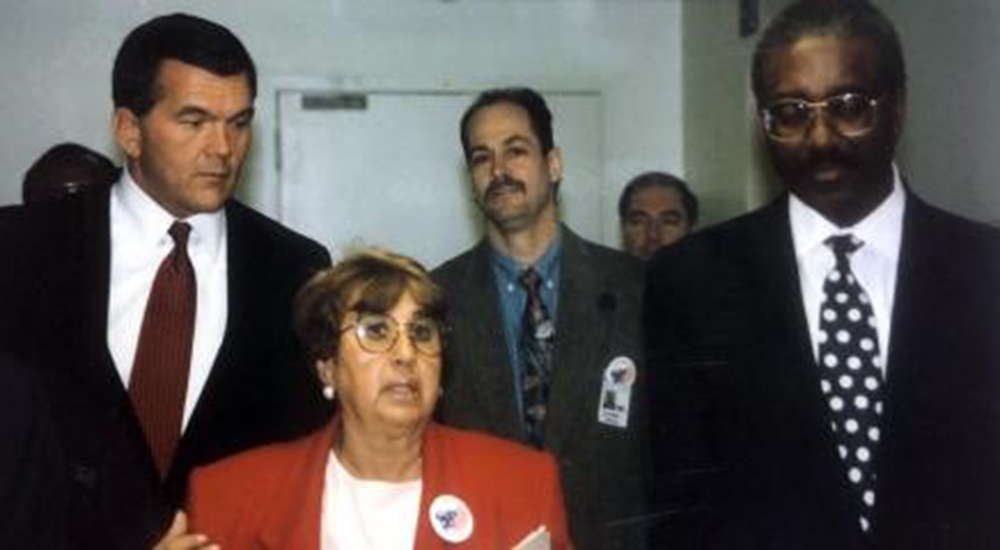As the Veterans Health Administration celebrates its 75th anniversary this year, VA Pittsburgh reflects on the work of a determined social worker who is credited in great part with establishing its homeless Veterans program.
The late Vincena “Vinnie” Malec paved the way for programs that go beyond clinical care. She helped Veterans whose problems are best solved without medicine.
VA Pittsburgh’s homeless Veterans program got its start in 1988 when Malec and her team partnered with American Legion to provide housing for ten homeless Veterans on Cypress Street in Coraopolis. From there, Malec tirelessly advocated for the establishment of VA Pittsburgh’s first Domiciliary Care Program. It opened in 1994 at the former Highland Drive campus.
Malec died in 2015, but the Domiciliary, or Dom, and its programs live on. The Dom is now located in the Veterans Recovery Center (VRC) on the H.J. Heinz III campus in O’Hara Township.
“A real pioneer” in her support of homeless Veterans
Those who knew Malec said she put her heart into helping homeless Veterans. VA Pittsburgh social worker David Allen described Malec as vocal, and a “real pioneer.”
“She was a hard person to say no to,” said Allen, who has been on staff since the Dom opened at Highland Drive.
Pictured above, Malec leads Pennsylvania Governor Tom Ridge, left, and VA Secretary Jesse Brown, right, on a tour of the new domiciliary at Highland Drive in 1994.
Lisa Fitzsimmons, VRC program manager, said Malec’s “persistence and consistency are why we have the program today.”
Rich Deakin, a vocational rehabilitation specialist, said space was tight at the Dom’s original site on Highland Drive. Dormitory style rooms each had three beds. Veterans had access to two TV rooms. Clinical services were provided in a large room, with staff offices interspersed throughout each wing.
Veterans worked hard to lift the stigma of homelessness
Word of the Dom’s existence and its substance abuse program spread. VA medical facilities from throughout Pennsylvania – including Erie and Philadelphia – began to refer Veterans to the program. Veteran occupancy quickly maxed out at 50, said Allen.
Veterans in the Dom program at Highland Drive traveled to University Drive for medical care as needed. An advantage to housing Veterans at Highland Drive was its recreational facilities.
“The Dom Veterans got involved in community softball and basketball leagues, they had use of the gym, the swimming pool and the bowling alley,” Allen said.
Buoyed by their newfound support, Veterans in the program worked hard to lift the stigma of homelessness.
“The Veterans staged car washes with the staff and volunteered for a service where they would walk staff members to their cars at night,” said Allen. “That built a lot of trust between the Veterans and the community.”
When it was announced the Highland Drive campus would close, VA Pittsburgh relocated the Dom to the Heinz campus in 2008.
It was during this time the Dom was being guided by Gary Glacken, MSW, who Deakin pointed out was the longest program manager to date (1996 – 2010).
3,455 Veterans served… a fitting legacy for Malec
“It was under Gary’s direction that the clinical programming was developed. He established the state-of-the-art design and program at the HJ Heinz facility. And He established the Veterans Recovery Center,” said Deakin. “Gary took what Vinnie started and guided it to be the successful program it is now.”
Unlike the condensed housing and recreational facilities at Highland Drive, the Heinz Dom is configured into homelike pods. The change helps Veterans learn independence and living skills. Some who enroll in the program, Fitzsimmons said, “only know the military where they’re told what to do, so they have to learn these skills.”
In the 27 years since Malec succeeded in having the Dom established at VA Pittsburgh, the program has served 3,455 Veterans – and counting.
“That’s a statistic that really helps tell our story,” said Allen.
And a fitting legacy for Malec.
If you are a Veteran who is homeless or know of a Veteran who is homeless, please call the National Call Center for Homeless Veterans at 877-4AID-VET (877-424-3838) for assistance. Phones answer 24/7/365 and will put you in touch with the closest VA medical center.
Keith Gottschalk is a public affairs specialist for the VA Pittsburgh Healthcare System.
Topics in this story
More Stories
For a group of Veterans at the Central Virginia VA Health Care System, Parkinson’s care includes a regular check-in to see what they’ve built with Legos.
Daughter and son-in-law find a diary of her father's life as a prisoner of war written on toilet paper.
VA announces positive Veteran satisfaction feedback on telehealth services, including video visits, in the first half of fiscal 2025.






